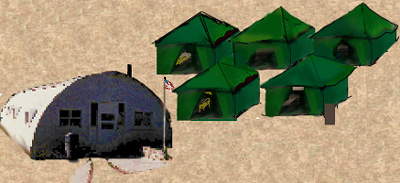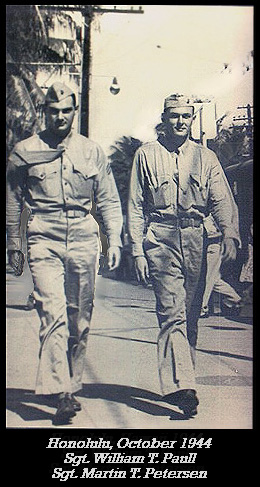
| CHAPTER SIXTEEN |
BACK AT CAMP TARAWA
August 1944 - January 1945
 he SeaBees had managed to spruce up Camp Tarawa during our excursion in the Marianas but it was still rather primitive... rows of green tents, Quonset structures with mess halls, showers, and latrines. The "heads" even had flush toilets.
he SeaBees had managed to spruce up Camp Tarawa during our excursion in the Marianas but it was still rather primitive... rows of green tents, Quonset structures with mess halls, showers, and latrines. The "heads" even had flush toilets.
I finally got a third stripe and became the Section Chief. My elation about this achievement was somewhat tempered because I had to move out of the tent that I shared with Petersen, Jasso, Morrison, and four other section members. Marine sergeants are an elite group; they actually run the Corps. Their biggest problem is to get the eager, fresh-faced, OCS 2nd lieutenants to stay out of the way, observe, and learn. Memorizing the Marine Corps Manual and running around bases in Virginia or California on simulated combat exercises has a very tenuous connection with the terrible realities of war.
As a new big-shot sergeant, I was supposed to stay aloof from lowly privates and corporals, so I moved into a tent with two other sergeants, Ray Kehoe and Russ Mitchell. Russ was the battery clerk and I didn't know him very well but he was the only Marine I ever met who knew what a pasty was, so naturally, we established an instant bond. He was from Iron Mountain, Michigan, where many Cornish miners had settled. We saved places for my old buddies, Marty Petersen and Bill Evans--- Russ had privileged information so he knew that Marty and Bill were both slated for a third stripe. We circumvented the rules when we moved in Bill and Marty. Five sergeants sharing the same tent was sending the wrong message to the troops. We were supposed to be living in roomy, four-man splendor instead of the crowded tents that were home for eight lesser peons.
 We started endless bridge games. Ray and I were partners and we devised an elaborate, secret bidding system. I can't remember all the devices we dreamed up to convey messages. Clearing your throat before you bid meant something significant; bidding with your cards fanned out, or bidding with the cards in a pack, glancing right, smiling, frowning ... all designed to impart an arcane message. We finally ended up knowing everything about each other's hand but I was never skillful enough to know what to do about it after I had all this information.
We started endless bridge games. Ray and I were partners and we devised an elaborate, secret bidding system. I can't remember all the devices we dreamed up to convey messages. Clearing your throat before you bid meant something significant; bidding with your cards fanned out, or bidding with the cards in a pack, glancing right, smiling, frowning ... all designed to impart an arcane message. We finally ended up knowing everything about each other's hand but I was never skillful enough to know what to do about it after I had all this information.
Christmas was a bad time. It was great to have a USO troupe come and put on a show, but it was poignant when they would sing White Christmas, or ask us to sing along with Silent Night. Most of us couldn't swallow the aching lumps in our throats. We would stare straight ahead and avoid making any eye contacts that would reveal glistening tears. Macho Marines are not supposed to be sensitive and emotional.
Now I shared a tent with two men who had true loves back home. Bill Evans and Marty seemed to forever sitting on their bunks writing letters to their girlfriends. I suppose I was envious. We were getting occasional radio broadcasts of music programs. "Casablanca" was a big movie in the States and Bill Evans was thrilled when his Marcie sent him a letter with all the lyrics of As Time Goes By . He thought this was a pledge of her undying devotion. Two weeks later he got his "Dear John" letter. I tried to convince Marty his Marian would eventually send him a "Dear John" too. He never wavered in his love and trust and neither did she. Now I feel abashed to recall how I used to try to pry him off his bunk and stop writing those endless letters back to Illinois. His Marian Jones was faithful and steadfast and is now one of my most cherished friends. She often berates me for being so cynical and doubting her fidelity back in those dark days.
Marty and I got five-day leaves. We were able to scrounge transportation on an Army plane and fly to Oahu. After we got there and discovered that Honolulu was swarming with servicemen, we almost wished we'd stayed in Hilo. We got a room at the huge downtown YMCA which was also the USO headquarters. We had free use of the swimming pool, steam rooms, and occasionally, even free meals. We could check out music albums and listen to them in little sound-proof cubicles; we could attend lectures, play bridge with the gracious motherly-type matrons, read books, sign up for the bus tours over Pele Pass to Kaneohe, get guided tours of King Kamehameha's historic palace... the Hawaiian civilians were exceptionally gracious. They adapted to the disruptive invasion of their city by thousands of soldiers, sailors, and Marines with good humor and tolerance.

Both Marty and I had an addiction to Chinese food and we ate our way around Honolulu. A sailor tipped us off to an exceptional Oriental restaurant that was located on the second floor of a pawn shop in a rather seedy area of the city. He gave us explicit directions on how to find it. Servicemen are used to standing in line for all kinds of services, so we were not surprised to find a long line leading up the steps to the restaurant. We were at the head of the stairs before we found out that we were about to become the next customers at a cat house. The eager guys behind us were pleased when we pulled out of line and went back downstairs. We checked out our directions and realized that we were on the wrong block. We eventually found the right place and enjoyed the most unforgettable fried rice of my life. Now, a half-century later, when Marty and I get together, we have a solemn tradition: We find a Chinese restaurant and always order a big bowl of pork fried rice.
Our wives wonder why we both get so amused and emotional about this rather unexceptional menu item.
 We went to a show at the Y, expecting to see hula dancers and discovered that we had wandered into a flute recital. Too polite to leave, we meekly sat through the performance. I was surprised that I almost enjoyed it. Marty, who can't even hum the national anthem well enough for anyone to recognize it, has an amazing knowledge and appreciation for classical music. He eventually managed to get me to develop an appreciation and taste for it too.
We went to a show at the Y, expecting to see hula dancers and discovered that we had wandered into a flute recital. Too polite to leave, we meekly sat through the performance. I was surprised that I almost enjoyed it. Marty, who can't even hum the national anthem well enough for anyone to recognize it, has an amazing knowledge and appreciation for classical music. He eventually managed to get me to develop an appreciation and taste for it too.
We rode the trolley out to Waikiki Beach and Diamond Head. By now I was an expert on tropical beaches so Waikiki didn't particularly impress or overwhelm me, but I loved it. I had seen wider, cleaner, and prettier beaches in my travels, but Waikiki did make a big hit. It didn't have gun emplacements, tank traps, barbed wire, or enemy snipers. For just one dollar we could play on the beach all day, rent a locker, a pair of trunks or a lava-lava, a cloth coverup which males tied around their waist. Native Hawaiians offered us out-rigger canoe rides, the Salvation Army served free pineapple juice and cookies, and no one got uptight when we strolled bare-chested and bare-footed through the elegant lobbies of the Moana and Royal Hawaiian Hotels, gawking at all the opulence and grandeur. This was one of the most pleasant interludes in those grim years. It was painful to go back to Hickam Field and wait for a flight back to Camp Tarawa.
At our past three WWII Forgotten Battalion reunions, our old instrument section was like a tight little club: Jimmy Francavilla, Marty Petersen and me. We had formed a tight nucleus since we were together from the start to finish of the Forgotten Battalion Saga . There is an indescribable bond between us three. We don't hang out together in a tight little exclusive group, but are always acutely aware of where the other two may be in the lounge, on the bus, or in the restaurant. It is funny.... when we are together we don't dwell upon any bad traumas about the war years.... it is: "Hey, do you remember when Ray Kehoe came off liberty in Hilo, Hawaii, sozzled, and tried to make a collect call to President Roosevelt to complain about the food?", or "Remember locking arms and doing the Hokey Pokey in the commissary store at the Kohala Sugar Factory...and all the employees standing around wondering what was going on?".
(Here we were -- the fierce young warriors just off Tarawa, swaying together and singing... "You put your left foot in, You put your left foot out...". That episode eased the tensions between the civilians and us... They discovered that we were just a bunch of scared, homesick kids.



Memoirs Title Page
Tipi's Retreat

Copyright 1996 by /\/\ / ( /-/ = // =



| Memoirs Title Page | Tipi's Retreat |

Copyright 1996 by /\/\ / ( /-/ = // =